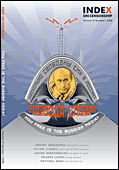Jo Glanville: The internet giant has done the right thing in standing up to Chinese interference and censorship. Now others must follow
In defence of Suzanne Breen
Jo Glanville on how production orders are being used to intimidate the press
Lord Justice Jackson, Jack Straw and the law
Jo Glanville is worried the Justice Secretary will fudge the libel issue
Binyam Mohamed: government delays again
Jo Glanville on a new twist for Binyam Mohamed
Binyam Mohamed: secrets and obfuscation
Index on Censorship joined the US and UK media today in an application to the High Court in London, seeking the disclosure of evidence in the case of Binyam Mohamed, the former Guantanamo detainee. Last year, information outlining Binyam Mohamed’s...
Enemies of free speech online are everywhere
This article was originally published on Comment is Free No surprises in the line up of enemies of free expression online in a new report from Reporters Without Borders: Burma, North Korea, China, Cuba, Saudi Arabia, Syria, Iran, Tunisia,...
Who’s protecting whom?
Five per cent of UK broadband connections have not signed up to the Internet Watch Foundation’s (IWF) system for blocking images of child pornography, despite the government's call for all Internet Service Providers to block access to illegal...
Queen of the Jungle no more
Did Carol Thatcher know that the BBC's taste and decency guidelines apply off air as well as on air? And that any ill-judged, politically incorrect comments that may fall from her lips at any moment could cost her her job? We don't know the full...
The BBC's Gaza conflict
Impartiality can be a form of censorship, says Jo Glanville Like all good censorship rows, the fallout from the BBC’s decision not to transmit the DEC appeal for Gaza has generated more publicity than it would ever have otherwise received. Every...

Editor’s pick 2008: Matthew Bown
A return to law and order, national pride and upright morals is colliding with Russia’s exuberant and scandal-seeking art world, writes Matthew Bown for Index on Censorship magazine's Amnesty award-winning 'How Free is the Russian Media' issue....

Editor’s pick 2008: Aryeh Neier on Skokie
In this exclusive article for Index on Censorship magazine, Aryeh Neier (right) recalls the controversial Skokie First Amendment case –-- still a landmark in the history of free expression after more than 30 years Read here

Editor’s pick 2008: Kenan Malik
The twentieth anniversary of Ayatollah Khomeini's death sentence on Salman Rushdie (right) takes place in February 2009. In this article for Index on Censorship magazine, Kenan Malik looks at the changes in liberal attitudes to free expression and...
